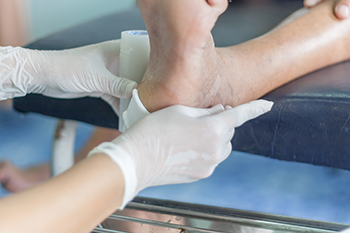
Foot ulcers are not only a concern for people with diabetes. Many individuals without diabetes also develop painful sores on the feet that are slow to heal. These ulcers can be caused by poor circulation, vein problems, pressure from footwear, or unnoticed injuries. People with limited mobility, nerve damage, or skin conditions are especially at risk. Unlike diabetic foot ulcers, these wounds may be overlooked or misdiagnosed, delaying proper treatment. If left untreated, they can lead to infection and deeper tissue damage. Identifying the root cause is essential to healing. A podiatrist can evaluate the ulcer, recommend wound care, and help prevent future sores. If you notice a sore on your foot that is not healing or keeps returning, it is suggested that you schedule an appointment with a podiatrist for an evaluation and expert care.
Wound care is an important part in dealing with diabetes. If you have diabetes and a foot wound or would like more information about wound care for diabetics, consult with Paul Hutchison, DPM from Hutchison Foot Clinic. Our doctor will assess your condition and provide you with quality foot and ankle treatment.
What Is Wound Care?
Wound care is the practice of taking proper care of a wound. This can range from the smallest to the largest of wounds. While everyone can benefit from proper wound care, it is much more important for diabetics. Diabetics often suffer from poor blood circulation which causes wounds to heal much slower than they would in a non-diabetic.
What Is the Importance of Wound Care?
While it may not seem apparent with small ulcers on the foot, for diabetics, any size ulcer can become infected. Diabetics often also suffer from neuropathy, or nerve loss. This means they might not even feel when they have an ulcer on their foot. If the wound becomes severely infected, amputation may be necessary. Therefore, it is of the upmost importance to properly care for any and all foot wounds.
How to Care for Wounds
The best way to care for foot wounds is to prevent them. For diabetics, this means daily inspections of the feet for any signs of abnormalities or ulcers. It is also recommended to see a podiatrist several times a year for a foot inspection. If you do have an ulcer, run the wound under water to clear dirt from the wound; then apply antibiotic ointment to the wound and cover with a bandage. Bandages should be changed daily and keeping pressure off the wound is smart. It is advised to see a podiatrist, who can keep an eye on it.
If you have any questions please contact our office located in Memphis, TN . We offer the newest diagnostic and treatment technologies for all your foot and ankle needs.
